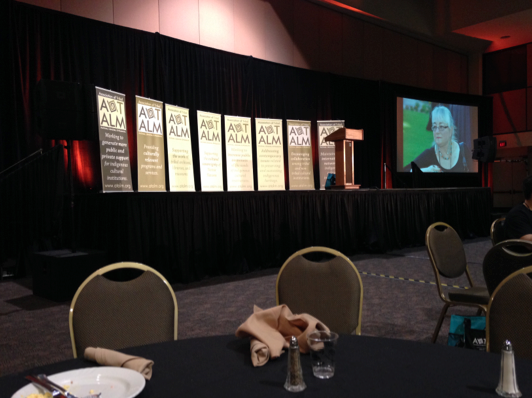Association of Tribal Archives, Libraries, and Museums
International Conference of Indigenous Archives, Libraries, and Museums
Report
June 9-12, 2014
Palm Springs, California

I attended the International Conference of Indigenous Archives, Libraries, and Museums hosted by Association of Tribal Archives, Libraries, and Museums (ATALM) for the second year in a row. At last year’s conference in New Mexico I hosted a small round table discussion that examined the handling of traditional cultural expression material. This year, however, I was able to attend the conference without the pressure of presenting a paper. It truly was more of a relaxing conference for me. Nevertheless, it was quite informative, as many of the issues pertaining to indigenous archives, libraries and museums are very similar to those of the cultural heritage organizations in the Pacific Islands. Indeed, ATALM’s mission is to serve the needs of those indigenous organizations that work to protect and advance cultural sovereignty.
As with most conferences, this one opened with dignitaries, and honorary and special guests giving speeches and rallying everyone to have a terrific conference, make some acquaintances, and to take what you have learned back home to apply to your daily duties. W. Richard West, President and CEO of the Autry National Center, was the honorary chair during the conference. He is also the Founding Director and Director Emeritus of the Smithsonian National Museum of the American Indian in Washington D.C. Thus, the ATALM conference has a special place in his heart. His inspirational speech highlighted and reiterated that leaders of tribal archives, libraries, and museums are essential to the cultural survival of tribal peoples in the 21st century and beyond. He believes that the work being done will help ensure that cultural resources are preserved and that Native values are reflected in an appropriate and authentic manner.
Although the conference was filled with interesting sessions, there were a few that stood out. On the first day I attended the Digital Imaging for Small Libraries, Archives and Museums workshop hosted by Tom Rieger, Director of Imaging Services at the Northeast Document Conservation Center. I found this workshop particularly interesting because many of the cultural heritage organizations in the Pacific Islands are starting to digitize their collections. In fact, the workshop provided tools to create professional, affordable, and easy-to-use digitization stations, incorporating cameras, scanners, and the software needed to operate efficiently. The workshop drew upon the 2010 Federal Agencies Digitization Guidelines Initiative that defines common guidelines, methods, and practices for digitizing historical materials.
The second intriguing session was presented from the perspectives of a Native Hawaiian librarian (Kauwela Valeho-Novikoff), an educational technologist (Pi’ilani Ka’aloa), and a graduate student (Shavonn Matsuda) from the Hawaii’inuiakea School of Hawaiian Knowledge- Kamakakuokalani Center for Hawaiian Studies. The session explored how these information specialists are charged with overseeing and managing their Waihona-the people, the physical, the digital, and the ways of knowing. Naturally, this session was particularly of interest to me since it dealt with Polynesians. The presenters shared their stories by deconstructing the essence of Waihona, beginning with its many definitions and aspects and how it relates to the care, management, guardianship, and leadership for the future of Native Hawaiian knowledge repositories.
The last session that was a must to attend was titled, Whatcha Gonna Do? Saving Wet Collections. Susan Hank who is the Library Programs Consultant, California State Library, and Julie Page, Co-Coordinator, Western States and Territories Preservation Assistance Service and the California Preservation Programs presented this hands-on practical workshop. I was drawn to this workshop as records in the Pacific Islands can be easily damaged by water. The workshop introduced the steps to salvage books, paper, photographs, and media collections. By learning the appropriate handling techniques, the attendees will be able to implement a successful recovery of materials.
All in all, the conference went very well. I did not realize that ATALM has only been around as an organization for just five years. Nevertheless, great progress has been made by American Indian Nations as keepers and presenters of their own histories and ways of knowing in such a short time. Recognizing the importance of Native voices in “postcolonial” America is crucial to preserving the cultural heritage of the indigenous peoples of the Americas. As for me, the conference has provided information and knowledge useful to help me assist cultural heritage organizations in the Pacific Islands. I look forward to passing on the new found knowledge to my colleagues.
-Brandon Oswald
